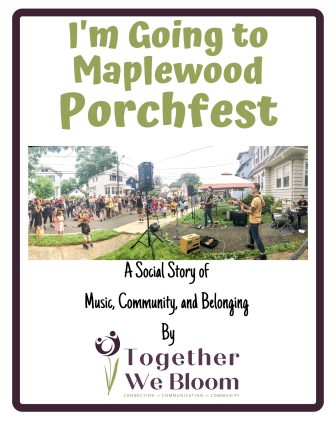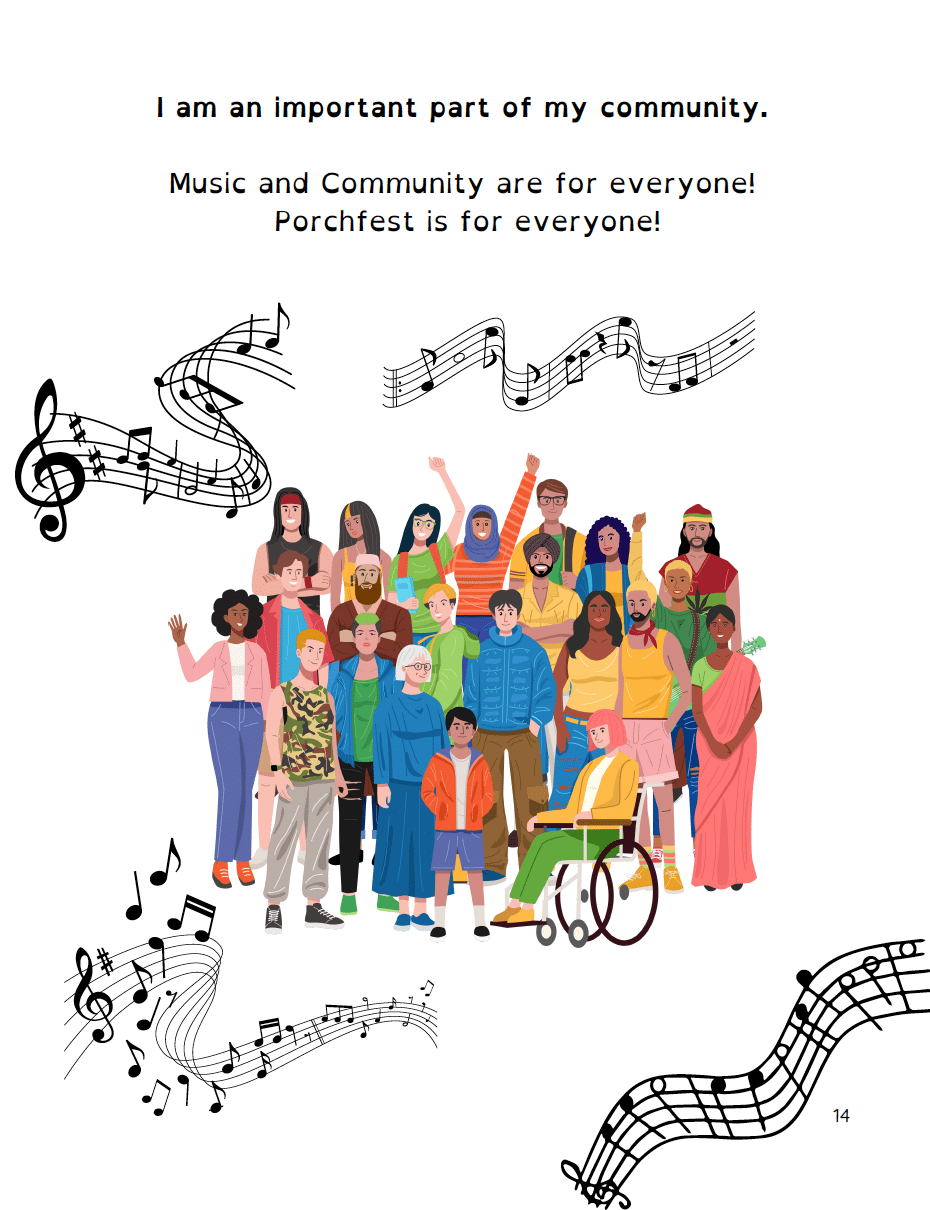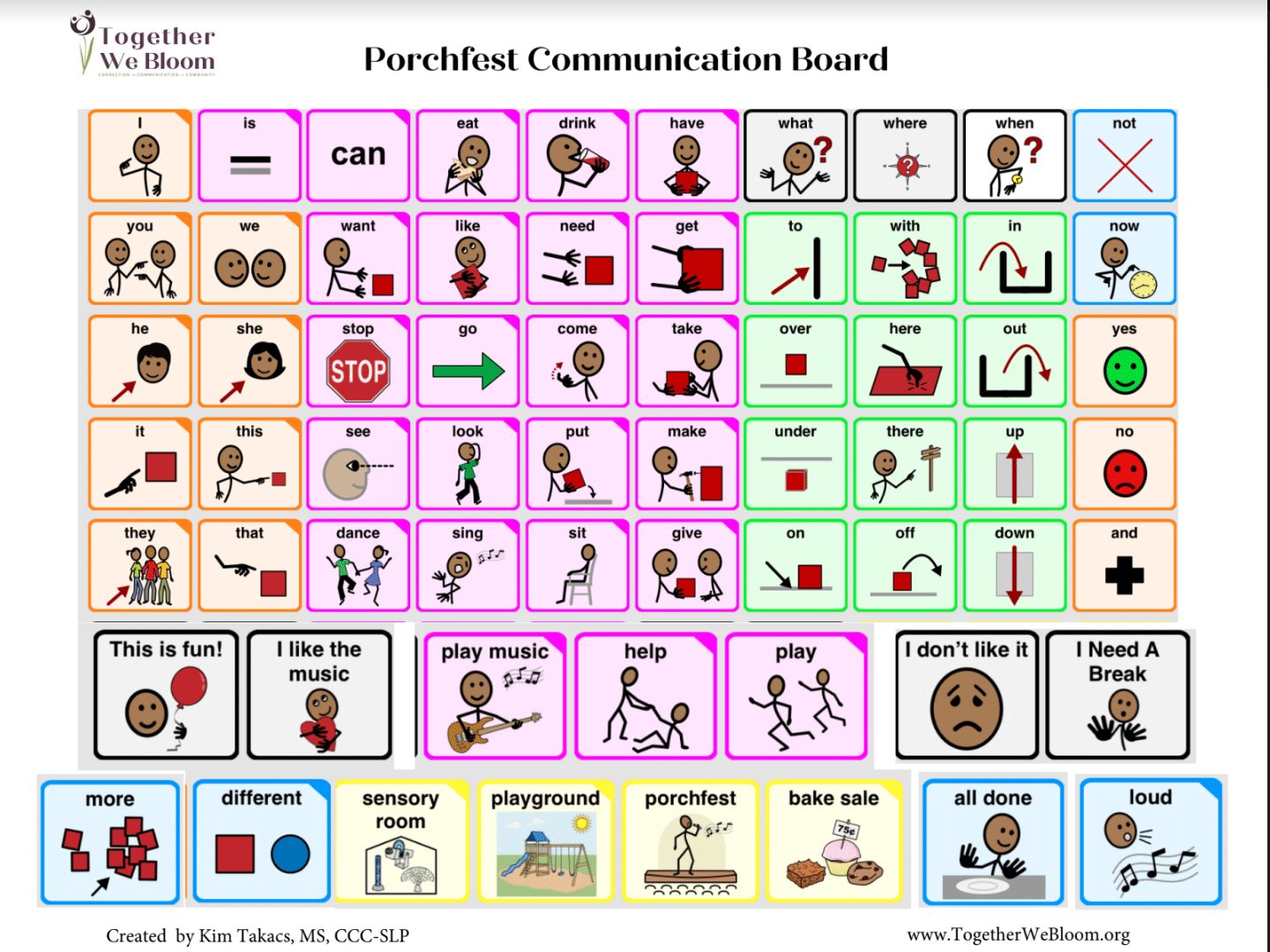When the 6th Annual Maplewood Porchfest takes over the Hilton neighborhood on Sunday, September 3, there will be a place for everyone to enjoy the event.
That includes neurodivergent adults and children who will be able to visit a sensory-friendly quiet room available inside DeHart Community Center hosted by Together We Bloom (TWB), a local non-profit run by Executive Director Kim Takacs, MS, CCC-SLP — who is a Hilton resident.
How did it come together?

“TWB reached out to Maplewood Township and Maplewood Porchfest to increase the accessibility of Porchfest for our neurodivergent neighbors,” Takacs’s husband Axel Oaks Takacs told Village Green. “There will be a sensory-friendly quiet room available inside DeHart Community Center hosted by TWB. Additionally, TWB is providing social stories and a communication board for neurodivergent children and young adults.”
You can learn more about these initiatives here: https://www.
“We wanted to get the word out about these Porchfest inclusivity initiatives,” said Axel, who is an assistant professor of Theology and Religious Studies at Molloy University. “Throughout many communities, neurodivergent children and adults remain an underserved and often misunderstood population, and we think these initiatives are the right step to redress a problem of exclusion that often occurs as a result.”

Village Green sent Kim Takacs a list of questions about the event. Read our Q&A here:
VG: How long have you been Executive Director of TWB?
KT: I’ve been ED officially for 6 months but here is a long winded answer to give you some background/context about TWB:
Together We Bloom is a new nonprofit that I founded last year. I am a speech-language pathologist and have done private practice work for the past 5 years (after 6 years of Early Intervention) and the nonprofit grew from my private SLP practice. In my work, I listened to the countless stories of my clients and their families of the ableism they face everyday and I began listening and learning more from disability self-advocates about their lived experiences. Through their leadership, advocacy, and openness, it became clear to me that my work of supporting children’s communication challenges through direct therapy was only part of the equation; this work needed to extend to making the community a more inclusive and equitable place for my clients. The disabilities of my clients, neighbors, and friends are not “a problem” (though they are often made to feel that way)- the problem is a society that excludes and marginalizes them both explicitly and implicitly.
So I started working towards this nonprofit with some really incredible people who are now our really awesome board of directors and advisors to the nonprofit- friends and colleagues with lived experience of disability and neurodivergence as well as parents of kids with disabilities. They have been incredible in supporting this off the ground. We founded TWB in August 2022, after months of planning, and then took six months putting everything together logistically. So that in February 2023 (right after we got our 501c3 status) , I officially merged my private practice with the nonprofit and was hired full time as the executive director which includes both continuing my clinical SLP work and focusing on disability justice, equity and inclusion initiatives.
We’re also work closely with the SOMA Peer Support and Action Group– a facebook group (also with active in-person participation) started by our Board Chair, Jessica Mingus and also led by TWB advisor, Rachel Henes. It’s made up of over 250 SOMA parents and caregivers of young kids with disabilities, ages 0-11, all committed to mutual support and advocacy for disabilities. (Mary- they are an amazing group, I highly recommend doing a piece on their community at some point).
VG: How long have you been a Hilton resident?
KT: Four years. Axel and I moved to NJ and the Hilton neighborhood in August 2019 (from Cambridge, MA) with our first kid, who is now 4 years old, and two dogs. We also have a 17 month old now too. We chose this town and neighborhood largely because of the diversity and commitment to equity and inclusion.
VG: Do you think that TWB will be partnering with Maplewood Township on other upcoming projects and events?
KT: I don’t know for sure but we certainly hope to. When we reached out to Maplewood Township about using DeHart for the sensory-friendly quiet room, Melissa Mancuso, Director of Community services was very enthusiastic to support, as was the Porchfest Committee including Tracy Sham and Susan. Our goal is to be a resource to the community to make many more events, business, and schools more understanding, accessible, and inclusive to individuals with disabilities and it was so encouraging for our first big event to have so much openness to being more inclusive from the community.
VG: South Orange has debutes a Mobile Sensory Station. Are you working with SO on this by chance?
KT: I’ve been very excited about this van! We are not yet connected but we’d love to be connected to them and support that initiative! Since hearing recently that the van was at a SO event, we’ve actually recently been trying to get in touch with people in charge to figure out how it all works and how we can get it out at more events.
VG: Do you know if this will be the first Maplewood event with a sensory-friendly component?
KT: I don’t know for sure if this is the first Maplewood event with a sensory-friendly room (I certainly haven’t heard of one before though) but I know this won’t be the last!
VG: How important is this for our community?
KT: I think making events more accessible and inclusive to neighbors with disabilities is vital for our community; for ALL of us, disabled and nondisabled. SOMA is a very diverse place and in many ways very progressive, but unfortunately disability– and the intersection of disability with other marginalized identities– is often left out of the conversations about what it means to be an inclusive and equitable place.
These community events like Porchfest are such a special part of bringing this community together. But for so many neurodivergent individuals or families with neurodivergent kids, an event that is not designed with their needs in mind can quickly become extremely overwhelming, making it inaccessible to them. So as a community, by not prioritizing accessibility, we’re unintentionally saying, “this wonderful community event is NOT for you” to many neurodivergent neighbors. The sensory-friendly quiet room, social stories, and communication boards that TWB created for Porchfest are a concrete way that we, as a community, can name that people with disabilities are not just included but that they BELONG at Porchfest and in our community. Of course this is really just the tip of the iceberg for making SOMA more accessible; there are so many different disabilities and types of access needs for people with disabilities. But it is an important step in welcoming and celebrating our neighbors with disability and making disability part of the equity conversation in our towns.


